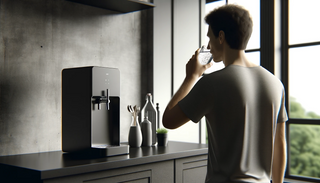Fasting is a practice that has gained popularity in recent years due to its potential health benefits, such as weight loss, improved digestion, and increased mental clarity. For some, fasting is also an integral part of their spiritual journey, as seen in the holy month of Ramadan. Regardless of the reason for fasting, proper hydration is crucial to ensure a safe and effective experience. In this article, we will explore the best ways to hydrate before, during, and after a fast, including specific tips for Ramadan fasting, helping you maximize the benefits while minimizing any potential risks.
Importance of Hydration During Fasting
Fasting can place stress on your body, and maintaining optimal hydration levels becomes even more critical during this time. Hydration is essential for numerous bodily functions, including:
- Regulating body temperature
- Lubricating joints
- Supporting digestion
- Removing waste and toxins
- Transporting nutrients
By staying well-hydrated before and after a fast, you can minimize potential side effects such as headaches, dizziness, and fatigue.

How to Hydrate Before a Fast
Preparing your body for a fast requires proper hydration. Here are some tips to help you hydrate effectively before your fast begins:
- Increase water intake: Aim to drink at least 8-10 glasses of water per day in the days leading up to your fast. This will help ensure your body is well-hydrated before the fasting period begins.
- Consume water-rich foods: Include fruits and vegetables high in water content, such as cucumbers, watermelon, strawberries, and leafy greens. These can help boost your hydration levels.
- Limit diuretics: Avoid or reduce consumption of diuretic beverages, such as coffee, tea, and alcohol, as they can lead to increased fluid loss.
- Electrolytes: Include electrolyte-rich foods, like coconut water, bananas, and avocados, to maintain a proper balance of essential minerals in your body.
How to Hydrate After a Fast
Rehydrating after a fast is equally important to ensure your body recovers and functions optimally. Follow these tips for effective hydration post-fasting:
- Break your fast with water: Drink a glass of room-temperature water to help gently rehydrate your body. Adding a pinch of Himalayan pink salt or a splash of fresh lemon juice can provide essential electrolytes.
- Sip water throughout the day: Continue to drink water gradually throughout the day, aiming for 8-10 glasses. Avoid chugging large amounts of water at once, as it can overwhelm your system and lead to discomfort.
- Reintroduce water-rich foods: As you start eating again, include water-rich fruits and vegetables in your meals to boost hydration.
- Choose hydrating beverages: Opt for drinks that help replenish electrolytes and hydration levels, such as coconut water or herbal tea.
- Monitor your body: Pay attention to your body's cues, like the color of your urine, to assess your hydration status. Aim for pale yellow urine, as darker shades may indicate dehydration.
The Role of Water Filters in Hydration
Investing in a high-quality water filter can significantly improve the taste and purity of your drinking water, encouraging increased consumption. Water filters remove impurities, contaminants, and unpleasant tastes and odors, providing you with clean and refreshing water. This not only promotes better hydration but also supports overall health and wellbeing.
Hydration Tips for Ramadan Fasting
Ramadan fasting involves abstaining from food and drink, including water, from dawn to sunset. Maintaining proper hydration during this time can be challenging, but it is essential for a healthy and comfortable fasting experience. Here are some tips to help you stay hydrated during Ramadan:
- Suhoor hydration: Suhoor, the pre-dawn meal, is a crucial time to hydrate before the day's fast begins. Make sure to drink at least 2-3 glasses of water during Suhoor, alongside consuming water-rich foods like fruits and vegetables.
- Break your fast with water: When breaking your fast at Iftar, the evening meal, start by drinking a glass of water or a hydrating beverage like coconut water or water infused with lemon, mint, or cucumber. This helps replenish lost fluids and electrolytes.
- Avoid caffeine and sugary drinks: Limit your intake of caffeinated and sugary beverages during Iftar and Suhoor, as they can lead to dehydration. Instead, opt for water, herbal teas, or milk to stay hydrated.
- Space out water intake: During the non-fasting hours, ensure you drink water consistently and gradually, rather than consuming large amounts at once. This allows your body to absorb the water effectively.
- Prioritize electrolytes: Include electrolyte-rich foods in your Suhoor and Iftar meals, such as bananas, avocados, yogurt, and dates. These foods help replace lost electrolytes and support hydration.
- Be mindful of salty foods: Limit the consumption of salty foods, as they can increase thirst and lead to dehydration. Opt for natural, unprocessed foods and use herbs and spices to flavor your meals.
- Adjust physical activity: It's essential to adjust your exercise routine during Ramadan to avoid dehydration. Opt for light exercises, like walking or stretching, and schedule your workouts during the cooler hours of the day or after Iftar.
By following these hydration tips, whether during Ramadan or other fasting periods, you can ensure a healthy, comfortable, and effective fasting experience. Remember to listen to your body's signals and prioritize hydration before and after your fast, as well as during Suhoor and Iftar for Ramadan observers. Incorporate water-rich foods, avoid diuretics, and maintain optimal hydration levels to support your wellbeing. Additionally, consider investing in a water filter to enhance the quality of your drinking water and promote better hydration and overall health.
Incorporating Sküma's countertop reverse osmosis system into your hydration routine during fasting periods, including Ramadan, can greatly enhance the benefits of proper hydration. Sküma purifies water to the highest degree, removing impurities and contaminants while ensuring optimal taste.
Our system goes a step further by adding back specific minerals and vitamins through long-lasting infusions, transforming your water into a healthy beverage that supports overall wellness.
By using Sküma during your pre-fast preparations, Suhoor, and Iftar, you can ensure you're consuming the purest, most beneficial water possible.
Stay hydrated, nourished, and ready to reap the rewards of your fasting experience with Sküma.







